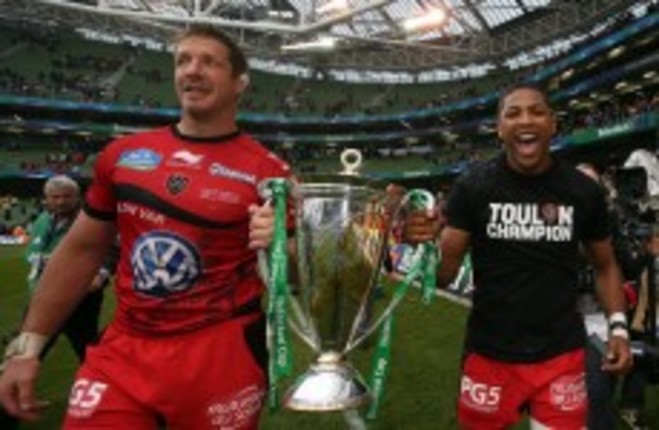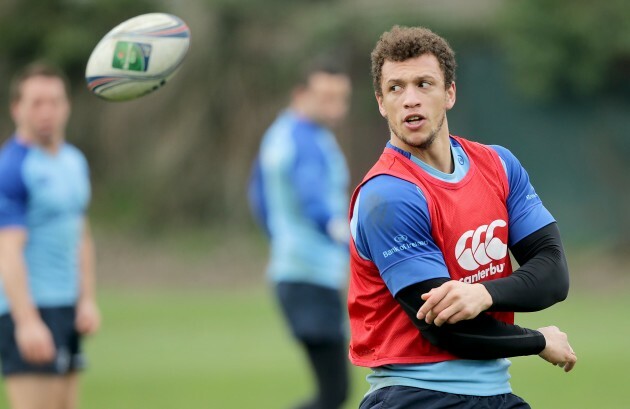FOR THE LAST 10 years, besides Wasps in 2007, the Heineken Cup has been a carved up between French and Irish teams, and this year the two countries make up six of the eight quarter finalists.
Since the competition began the French sides have always been wealthier, with bigger squads and greater resources, yet the two countries have produced the same amount of winners (six).
With the extra cash they’ve accumulated in recent times through TV deals and wealthy benefactors, the French clubs have almost always opted for size and power.
Toulon, for example, have bought Bakkies Botha, Carl Heyman, Juan Smith, Danie Roussow, and Mathieu Bastereaud. There’s a claim to be made that they’re all the most powerful men in their respective positions in world rugby. All are well rounded players, but not one of them could claim to be the most skillful option available.
Clermont have perhaps the biggest backline in the history of the sport with Aurelien Rougerie, Sitiveni Sivivatu, Lee Byrne and Napolioni Nalaga. Even Toulouse, despite their historical devotion to skill, have in recent years opted more for imported bulk with the signings of Louis Picamoles, Iosefa Tekori, and Census Johnston. Montpellier and Racing Métro have applied a similar formula.
In contrast, look at some of the key signings made by Irish provinces over the last few seasons – Rua Tipoki, Christian Cullen, Doug Howlett, Paul Warwick, Lifemi Mafi, Ruan Pienaar, Jarred Payne, Felipe Contepomi, Isa Nacewa, Chris Whitaker, Rocky Elsom, Dan Parks – none of whom were chosen for their size. There have been a few huge men brought here such as Jean de Villiers, John Afoa, Johann Muller, and Brad Thorn, but they’re not the norm.
The idea of super rich clubs is still relatively new to rugby, so we’re yet to see the effects of continued wealth over a long period of time, but the early signs are that money will make the sport even more uneven than is the case with football. Football coaches can use massed defences, man marking and other tactics to deal with more technical opponents. In rugby, if big men keep running at you, you have to keep tackling them.
Having a more powerful team of course doesn’t guarantee you victory, but over the course of a league it weighs the odds heavily in your favour. You’re playing a lower percentages game, that requires less imagination. The bigger side remains within its comfort zone, the smaller team has to take risks to survive.
As things stand the Heineken Cup format suit the Irish sides as they don’t have to face massive men every week, but if it was to change to more of a league structure, they would struggle.
Loss of speed and aerobic capacity used to be the trade off for big teams, as smaller men could work their opponents around the park, find space out wide and reap the rewards of superior fitness late in the game. These factors don’t apply as much anymore.
Big men get subbed off around the 60 minute mark so can run themselves ragged in the knowledge they wont have to last till full time. Jonah Lomu was the first real example of size not being an inhibitor to speed, but now giant pace-men are commonplace with Nalaga, Sivivatu, Savea, Fickou, North and Cuthbert, among others, all thriving at club and international level.
There will always be exceptions to the rule. Castres won the Top 14 last year with two 5ft 9” men in their backline in Brice Dulin and Max Evans, New Zealand went unbeaten last year with Aaron Smith (5ft 6”) and Aaron Cruden (5ft 9”) at halfback, and most pertinent of all are Ireland, who won the Six Nations with the smallest, smartest team in the championship.
Leinster and Munster, too, have repeatedly shown over the years that they can out think bigger teams but if the wealth gap continues to grow there will come a point where the physical disparity on the field will be impossible to overcome.
You can follow Second Captains on Twitter here.


